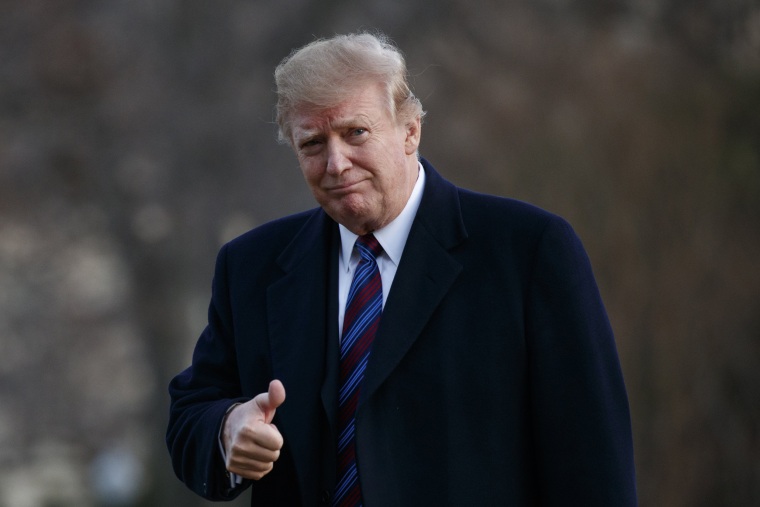During his testimony before the House of Representatives on Wednesday, former Trump lawyer Michael Cohen was asked by Rep. Raja Krishnamoorthi, D-Ill., if the President used non-disclosure agreements to try to silence people who might come forward with damaging information.
“That was the goal,” Cohen said.
The use of these agreements by high-profile people seeking to hide their worst behaviors from the public is nothing new. But when the president of the United States employs them, the potential consequences are far more sweeping, damaging, and dangerous.
My organization, Public Justice, is part of the legal team representing Alva Johnson, a former Trump campaign official who filed suit on Monday alleging that then-candidate Trump forcibly kissed her during a campaign rally in Florida, and that the campaign discriminated against women of color, paying them far less than white men with similar, or even lower, levels of responsibility.
The facts our legal team uncovered are strong evidence that the Trump campaign violated the Equal Pay Act. While Ms. Johnson was paid an average of just over $3,600 per month during her time on the campaign, payroll documents show that others — particularly white men — were much more richly rewarded for their service.
For instance, Sidney Bowdidge, a white male former massage therapist who served on the same campaign team as Ms. Johnson, was paid an average of nearly $4,000 per month for his first six months on the campaign, and $7,000 per month thereafter. Matt Cpiepielowski, another white man on the same team as Ms. Johnson, was paid an average of $8400 per month during his first six months on the job, and $10,500 per month for the remainder of his time with the campaign. And Austin Browning, a white male high school senior hired during the general election, was paid an average of nearly $5,200 per month during his tenure.
The list goes on. (Literally. It’s outlined in detail in Ms. Johnson’s complaint.)
So the question is why Ms. Johnson — a senior staffer with years of experience — was paid less than a high school senior. It wasn’t her job performance: Ms. Johnson was promoted to increasingly senior positions throughout her time on the campaign. And she organized one of the largest rallies of 2016, in Madison, Alabama, bringing out more than 30,000 supporters for an event in her home state. The president himself called the event “Amazing!” in his speech and later told Ms. Johnson that she had been doing a great job and that he would not forget about her.
He apparently forgot, however, that the law required his campaign to give Ms. Johnson equal pay for equal work.
But Trump also probably assumed that no one would ever know because, in order to work for the campaign, Ms. Johnson was required to sign a non-disclosure agreement.
However, the campaign’s non-disclosure agreement is basically a laundry list of provisions courts have found unenforceable.
For starters, courts have repeatedly held that non-disclosure agreements cannot be used to hide illegal activity — and, by willfully ignoring the Equal Pay Act, Trump and his campaign were breaking the law. No non-disclosure agreement, no matter how cleverly written (and the one used by the Trump campaign wasn’t very clever at all), should prevent an employee from bringing claims of illegal misconduct in court.
Perhaps unbeknownst to Trump’s attorneys, the courts are also fairly (and fortunately) persnickety about what NDAs can be used for. Trump’s is so broad, so sweeping – and so outrageous – that there is little question that it is legally unenforceable.
The document attempts to define “confidential” as anything “Mr. Trump insists” must be confidential, whether the campaign worker knew that ahead of time or not. Plus, it doesn’t attempt to just shield Donald Trump from criticism, it seeks to impose a gag order on any criticism of his family, his businesses — even products carrying the Trump name — forever.
Yes, that means it would be a violation of the NDA — if the courts allowed it, which is hard to imagine — for a former Trump campaign worker to ever publicly criticize Trump wines, Trump hotels or those now-infamous Trump steaks.
Besides which, the non-disclosure “agreement” isn’t an agreement at all: No one from the Trump campaign ever signed it. The courts have held in other cases that, unless both parties sign, neither party is held to its terms.
It is almost amusing... until you realize that the president of the United States may very well try to use it to cover up wage discrimination against women of color who worked on his campaign.
We can’t know how many campaign — or, for that matter, White House — employees Trump’s non-disclosure agreements have silenced. As Ronan Farrow explained in a “New Yorker” story about our lawsuit, “Johnson’s case, and the broader pattern of high-profile legal skirmishes over Trump’s use of nondisclosure agreements, could produce significant legal rulings and affect the president’s ability to enforce the contracts.”
Defeating the NDA, and the forced arbitration provision within it that attempts to force workers like Ms. Johnson out of court and into secretive arbitration proceedings, will help enable those who may have believed they had no right to speak to come forward.
That is our goal.




